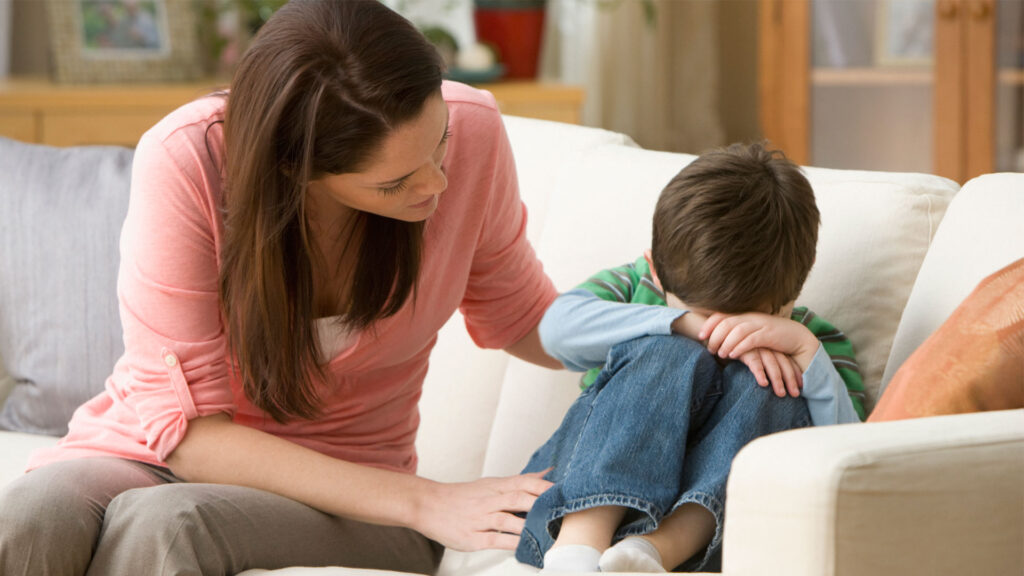
Emotional outbursts and yelling have long been accepted as a way of disciplining children, but recent psychology research reveals why such tactics may be counterproductive. In this article, we tackle the challenge: how can we educate our children without resorting to raised voices and anger? By exploring the realm of emotional discipline, we present research-backed, effective strategies designed to promote calm and respectful communication. This guide is not just about keeping your cool; it’s about empowering yourself with techniques to build trust and understanding within your family. Continue reading to discover practical tools and relatable examples that will help you handle challenging situations with confidence and emotional intelligence.
Understanding Emotional Discipline: A Modern Approach
The world of psychology has evolved significantly over the last few decades, and our understanding of emotional discipline is no exception. Rather than resorting to outdated methods like yelling, experts now advocate for calm and empathetic approaches to discipline. This section reviews contemporary psychological perspectives and emphasizes a shift from authoritarian methods towards strategies that harness emotional awareness. Modern emotional discipline is all about self-regulation and empowering both parents and children.
Recent studies clearly show that stress and anxiety can be contagious. When parents yell, they unwittingly escalate stress hormones, making it harder for everyone to think clearly or communicate effectively. On the other hand, staying calm not only helps you manage conflicts but also creates a safe space where children learn how to regulate their emotions. This approach builds trust and fosters a truly strong bond between parents and children.
Adopting a calm demeanor does not mean ignoring behavioral issues; it means addressing them with a clear and rational mindset. Research in developmental psychology shows that children exposed to respectful, calm communication are more likely to develop resilience and positive social skills. The intellectual and emotional benefits of this approach pave the way for more progressive parenting and educational practices.
The Psychological Foundations Behind Calm Parenting
Psychology teaches us that emotional intelligence is vital for positive interactions. Calm parenting is rooted in the belief that empathy and self-awareness promote healthy communication. By pausing momentarily before reacting, parents open the door to more meaningful interactions with their children. Understanding and connecting emotionally is the cornerstone of calm parenting.
The concept of emotional regulation extends beyond parenting to all interpersonal relationships. Neuropsychological research identifies the prefrontal cortex as key to moderating emotions. Strengthening this area through mindfulness and reflective practices helps individuals maintain composure in challenging situations. The link between brain function and emotional control is one of the main drivers of this modern, effective approach.

Furthermore, developmental theories highlight that children often mimic the behavior of their caregivers. When parents model calm behavior during stressful times, children learn by example. This positive reinforcement cycle creates an environment where respectful behavior becomes the norm. Psychological insights, therefore, offer a robust framework to understand and implement calm parenting practices.
Empathy and Self-Awareness
Empathy goes beyond simply feeling for someone; it is about actively understanding and validating the emotional experience of others. This skill is fundamental when addressing conflicts with compassion rather than judgment.
Self-awareness, on the other hand, is about recognizing your own emotional states, triggers, and reactions. This dual focus allows you to develop personalized strategies for managing your emotions before they escalate.
The Role of Neuroplasticity
Neuroplasticity refers to the brain’s remarkable ability to adapt and reorganize itself in response to new experiences. This concept underpins how practicing calm, regulated behaviors can lead to lasting changes in neural pathways.
With consistent practice, emotional discipline can reshape how the brain handles stress and reactivity, resulting in enhanced cognitive functions and a more balanced emotional state.
Practical Strategies to Master Your Emotions
To harness the power of emotional discipline, you need practical strategies that blend seamlessly into your daily life. Techniques such as mindfulness exercises, deep breathing, and journaling are proven methods that help you identify and manage emotional triggers before they lead to conflict. Practical techniques are your key to creating a stress-free environment.

Implementing these strategies does not require radical changes. Small, consistent steps can have a significant impact. For example, taking a deep breath before reacting to a child’s misbehavior can prevent escalation. This mindful pause helps you stay in control while also teaching your children to manage their emotions.
By incorporating these habits into everyday interactions, you create a preventive strategy against conflict escalation. Over time, these practices become second nature, helping to establish a calmer home environment where emotions are acknowledged and positively reinforced.
Integrating Emotional Discipline in Daily Routines
Integrating emotional discipline into your daily routine starts with the conscious decision to prioritize calm and reflection. This means setting aside dedicated time for self-assessment and family communication. Modern psychology shows that establishing clear routines not only reduces stress but also creates a sense of security and stability for children. Consistency is crucial for the long-term success of these practices.
Parents can initiate this process by creating morning or evening rituals that allow the family to discuss the highs and lows of the day. These short, daily check-ins act as valuable safety valves, releasing built-up tension and reinforcing emotional bonds.
In addition to these structured routines, every interaction in daily life—be it during meals or shared activities—offers a chance to practice emotional discipline. Over time, these small moments contribute greatly to personal growth and overall family well-being.
Creating a Family Routine
Start with simple routines such as a daily family check-in, where everyone can share their experiences and feelings without judgment. This practice fosters an atmosphere of mutual support and understanding.
Introduce a ‘silence moment’ for a brief period of mindfulness, helping each family member align their energy with the calm of the entire group.

Tools and Resources for Continuity
Explore apps that assist in guiding mindfulness sessions. Many digital tools now offer guided meditations designed specifically for families, easing the transition towards a more peaceful home life.
Additionally, consider joining workshops or local community groups dedicated to emotional intelligence, which can provide fresh perspectives and strengthen your commitment to calm parenting.
Case Studies and Real-Life Applications
Real-life examples clearly demonstrate that mastering emotional discipline without yelling leads to transformative results. In one case study, a family that struggled with frequent conflicts significantly reduced arguments by adopting calm communication techniques. Over time, they noticed improvements not only in parental relationships but also in the child’s behavior. This shift, supported by extensive psychological research, shows that patience and self-regulation are key to nurturing healthy interactions. Real-life cases confirm the undeniable benefits of emotional discipline.
Another example comes from the educational field, where teachers used similar techniques to manage classroom behavior. By incorporating mindfulness sessions and reflective practices, classrooms experienced fewer disruptions, resulting in a more positive and productive learning environment. These strategies emphasize reasoned, calm responses over punitive measures.
These examples serve as a powerful testament to the broad applicability of emotional discipline in various areas of life. As more families, educators, and professionals embrace these practices, the overall impact on community well-being continues to grow. The lessons drawn from these case studies offer practical insights that can be adapted across different contexts to enhance both personal and professional interactions.
Content Additional

To further enrich your understanding and practical skills, this additional section delves into advanced techniques and the reasons behind mastering emotional discipline. Many psychology experts emphasize that building emotional resilience is a gradual journey rather than an overnight transformation. Routine mental health check-ups and open dialogue are key to sustaining the benefits of calm parenting. These expert practices underscore the importance of continuous effort in developing a balanced emotional life.
It is important to recognize that even small improvements in emotional discipline can lead to significant benefits over time. Setting realistic daily goals, practicing gratitude, and celebrating minor achievements can all contribute to a more optimistic and resilient mindset. When parents and educators invest in these strategies, they not only improve immediate family dynamics but also contribute to a broader culture of emotional intelligence in both community and professional settings.
Advancements in technology have introduced innovative tools to support this journey. Mobile applications that track mindfulness routines and online communities that encourage sharing of both successes and setbacks make it easier than ever to nurture emotional discipline. This blend of digital resources and traditional psychological practices empowers anyone willing to embrace change, ensuring that emotional growth remains a dynamic and evolving process that benefits individuals, families, and communities alike.
Advanced Techniques for Emotional Mastery
Cognitive behavioral techniques can help you identify and reframe negative thought patterns that lead to emotional outbursts. By understanding and challenging these thoughts, you can gradually develop more positive and constructive responses.
Additionally, practices like progressive muscle relaxation and guided imagery offer alternative methods to manage the physical symptoms of stress, further supporting your journey towards emotional balance.
Digital Tools and Communities
The rise of digital health platforms now provides easy access to expert guidance and community support. Many apps offer guided meditations tailored for both parents and children, enhancing the ability to manage stress during tense moments.
Participating in online forums where individuals share their experiences fosters a sense of solidarity and continuous learning, reinforcing your commitment to mastering emotional discipline.
In summary, mastering emotional discipline without yelling involves embracing a paradigm of empathy, understanding, and self-awareness. Throughout this discussion, we have seen how modern psychology supports more positive and effective parenting and interpersonal strategies. The methods shared promote reflection, active listening, and adaptive behavior changes that can transform family dynamics. By recognizing and managing your emotions, you not only create a healthier environment for your children, but also set an example that fosters long-term emotional well-being. Remember that change does not happen overnight, but every thoughtful step brings you closer to a more emotionally intelligent future.




